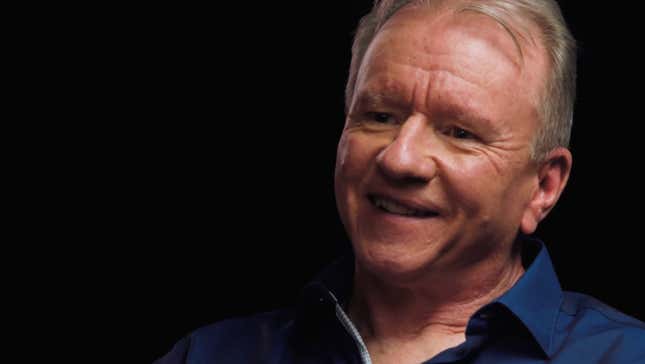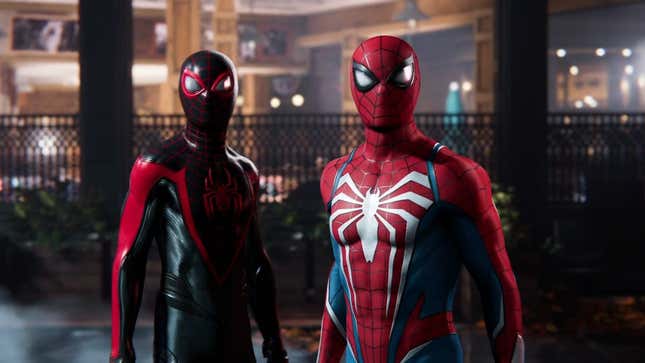
Yesterday, PlayStation boss Jim Ryan said he wants his company’s games to one day be as prolific as music or movies. He would love to see a world where potentially “hundreds of millions of people” could enjoy them. It’s the type of future a lot of gaming executives talk about, but one that Sony seems to have no interest in actually achieving.
Ryan’s remarks came during a 20-minute interview with GamesIndustry.biz at GI Live: London where, despite being billed as a keynote fireside chat, he didn’t actually say a whole lot that was noteworthy. What does he think defines PlayStation? Games, community, and “brand.” What makes the PS5 so “cool?” The games of course. Which one is his favorite? Ratchet and Clank: Rift Apart of course, the PS5 tech showpiece you can pick up this holiday season for $70.
Instead of commenting on, or being asked about, industry issues around crunch, accessibility, or game preservation, the most interesting thing to come out of the Sony Interactive Entertainment CEO’s mouth was his wish to, “see a world where the games that we make at PlayStation can be enjoyed by many tens of millions of people, perhaps hundreds of millions of people.”
He went on:
Right now success with the current console model, a really great PlayStation hit you’re talking ten or 20 million people being able to play that game. We’re talking about games stacking up against music, we’re talking about games stacking up against movies. Music and movies, they can be enjoyed by almost limitless audiences.
And I think some of the art that our studios are making is some of the finest entertainment that has been made anywhere in the world. And to kind-of gate the audience for the wonderful art, wonderful entertainment that our studios are making...to gate the audience for that at 20 or 30 million, frustrates me. I would love to see a world where hundreds of millions of people can enjoy those games.
It’s an admirable sentiment, especially, as Ryan points out, because of the implications it would have for developers and players, their hobby opening up to a much wider audience. “That’s potentially really amazing and really powerful,” Ryan said. But it also seems bizarrely at odds with Sony’s current strategy around the PS5.
The company hasn’t made video game streaming a center piece, nor has it bet big on PS Now the way Microsoft has with Game Pass. It doesn’t release many small games, or mobile games. And the company only just started bringing some of its biggest blockbusters to PC—years after they originally came out. It’s no fault of Sony’s that a pandemic has led to manufacturing shortages and upended global supply chains, but even if you could find a PS5 in stores, it represents the high-end of console gaming when compared to the Xbox Series S, Nintendo Switch, and Switch Lite.
If anything, Sony appears to be doubling down on the prestige blockbuster model, investing heavily in a small slate of big releases. PS4 ended last generation with Marvel’s Spider-Man, Ghost of Tsushima, and The Last of Us Part II, each of which released to strong sales and general critical acclaim. God of War won Game of the Year at the 2018 Game Awards. Herman Hulst, previously head of Guerilla Games, maker of Horizon Zero Dawn, was promoted to head of Sony Worldwide Studios. And now 2022 is set to bring sequels to many of these games, with others coming not long after. It might continue to make the PS5 the ‘coolest’ console on the market, but it doesn’t seem like a recipe for reaching anyone not already onboard.

“Sony’s focus on exclusive blockbusters has come at the expense of niche teams and studios within the PlayStation organization, leading to high turnover and less choice for players,” reported Bloomberg in April. Instead of investing in smaller teams to pursue more experimental projects, Sony has reportedly doubled down on remakes and sequels of its most successful series. Japan Studio, responsible for a range of intriguing smaller projects during the PS3 and Vita days, was downsized and reshuffled around earlier this year. And some independent developers complained over the summer that Sony can be difficult to work with compared withMicrosoft and Nintendo.
Ryan spelled out the ideology at the heart of modern PlayStation in an interview with TMTPost around the same time. “Players only remember best games rather than OK games,” he said. “If it is a best game, players may want a sequel, and they will also want to buy a sequel, but no one really cares about a game that is only OK.”
This line of thinking has its critics though, including from previous iterations of PlayStation.
“Right now, we are narrowing ourselves down into genres and sequels and certain types of games,” Shawn Layden, former CEO of SIE Worldwide Studios, told GamesIndustry.biz in July. “Favourites like my own, like Parappa and Vib-Ribbon, those things don’t seem to get a chance to come out on stage. That’s bad for the industry and for fans. Over time, that leads to a crumbling of the games industry if we just keep talking to the same people and telling the same stories in the same way.”
Layden, who abruptly stepped down from Sony in 2019 a few months after Ryan took over, has recently been a critic of burgeoning development budgets, calling for companies to embrace shorter, cheaper games instead. This sentiment has also become a rallying cry for others in the industry. “I want shorter games with worse graphics made by people who are paid more to work less and i’m not kidding,” FanByte Media’s Jordan Mallory tweeted in June 2020. In August of this year, indie developers answered the call with the “Shorter Games, Worse Graphics” bundle.
Video games, and the people who make and play them, have always had a chip on their shoulder about their status in the wider culture. Today, games are a $180 billion global industry, no one but internet sickos ask if they are still art, and Hollywood is desperately snatching up whatever gaming IPs it can. But it’s still not as ubiquitous as music or TV, especially outside of mobile and PC. The PS4 outsold the PS3 by an estimated 30 million units. The PS5 might even sell another 30 million more. But that would still put it behind the best selling console of all time: The PS2. A console for which, it could be noted, there was the most astonishing array of games of all lengths and budgets.
“For us to grow the audience for gaming, we have to go where they are,” Layden told GamesIndustry.biz back in the summer. “We’ve been here 25 years, they know where we are, and they haven’t come yet. And there’s a reason. We need to discover and interrogate that reason.”
I’m sure there are many reasons, but I’m doubtful another Horizon Zero Dawn or God of War will be the answer.